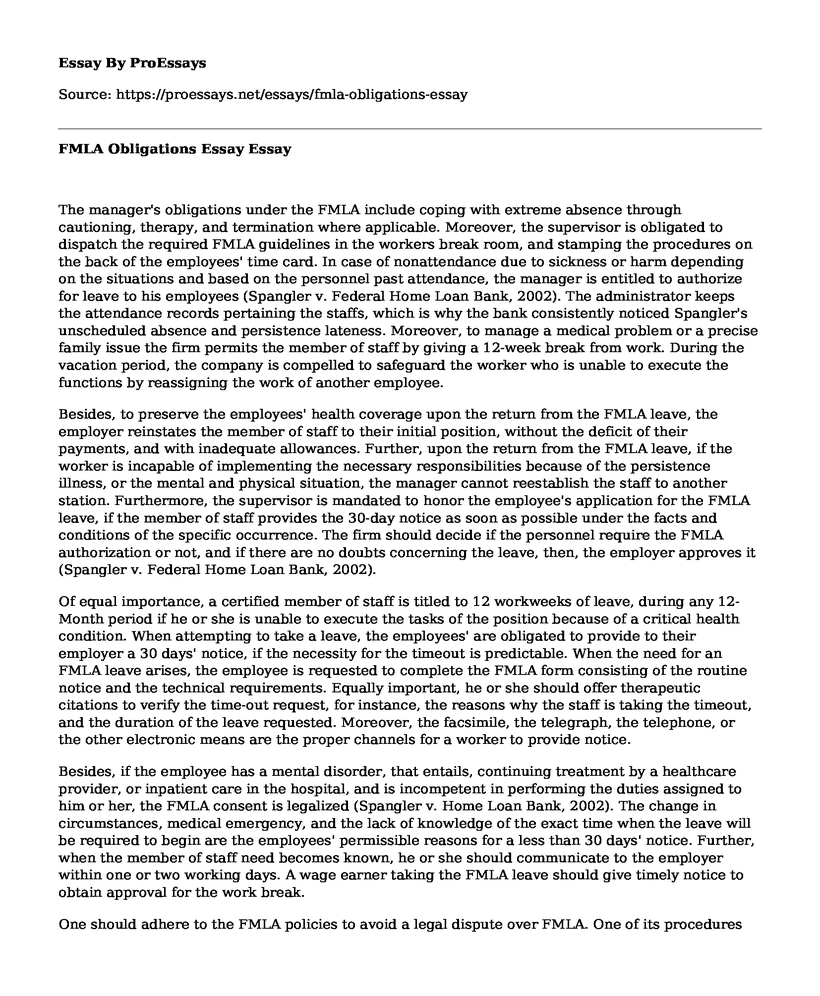The manager's obligations under the FMLA include coping with extreme absence through cautioning, therapy, and termination where applicable. Moreover, the supervisor is obligated to dispatch the required FMLA guidelines in the workers break room, and stamping the procedures on the back of the employees' time card. In case of nonattendance due to sickness or harm depending on the situations and based on the personnel past attendance, the manager is entitled to authorize for leave to his employees (Spangler v. Federal Home Loan Bank, 2002). The administrator keeps the attendance records pertaining the staffs, which is why the bank consistently noticed Spangler's unscheduled absence and persistence lateness. Moreover, to manage a medical problem or a precise family issue the firm permits the member of staff by giving a 12-week break from work. During the vacation period, the company is compelled to safeguard the worker who is unable to execute the functions by reassigning the work of another employee.
Besides, to preserve the employees' health coverage upon the return from the FMLA leave, the employer reinstates the member of staff to their initial position, without the deficit of their payments, and with inadequate allowances. Further, upon the return from the FMLA leave, if the worker is incapable of implementing the necessary responsibilities because of the persistence illness, or the mental and physical situation, the manager cannot reestablish the staff to another station. Furthermore, the supervisor is mandated to honor the employee's application for the FMLA leave, if the member of staff provides the 30-day notice as soon as possible under the facts and conditions of the specific occurrence. The firm should decide if the personnel require the FMLA authorization or not, and if there are no doubts concerning the leave, then, the employer approves it (Spangler v. Federal Home Loan Bank, 2002).
Of equal importance, a certified member of staff is titled to 12 workweeks of leave, during any 12-Month period if he or she is unable to execute the tasks of the position because of a critical health condition. When attempting to take a leave, the employees' are obligated to provide to their employer a 30 days' notice, if the necessity for the timeout is predictable. When the need for an FMLA leave arises, the employee is requested to complete the FMLA form consisting of the routine notice and the technical requirements. Equally important, he or she should offer therapeutic citations to verify the time-out request, for instance, the reasons why the staff is taking the timeout, and the duration of the leave requested. Moreover, the facsimile, the telegraph, the telephone, or the other electronic means are the proper channels for a worker to provide notice.
Besides, if the employee has a mental disorder, that entails, continuing treatment by a healthcare provider, or inpatient care in the hospital, and is incompetent in performing the duties assigned to him or her, the FMLA consent is legalized (Spangler v. Home Loan Bank, 2002). The change in circumstances, medical emergency, and the lack of knowledge of the exact time when the leave will be required to begin are the employees' permissible reasons for a less than 30 days' notice. Further, when the member of staff need becomes known, he or she should communicate to the employer within one or two working days. A wage earner taking the FMLA leave should give timely notice to obtain approval for the work break.
One should adhere to the FMLA policies to avoid a legal dispute over FMLA. One of its procedures states that the supervisor should excuse occasional absences due to sickness or injury, depending on the circumstances and past attendance. Secondly, the FMLA allows the authorized staffs the unconditional right to take the FMLA leave for suitable reasons under the law. Moreover, the employer cannot disprove the legitimate use of the FMLA leave, for example, the personnel's' failure to obey the employer's internal processes cannot authorize the manager to delay or prohibit a member of staff the FMLA timeout. Equally important, excessive absenteeism by the employees is managed through, psychotherapy, cautioning, and infrequently termination (Spangler v. Federal Home, 2002). Furthermore, it is evident that the FMLA Bank warned and counseled Spangler during her working periods, to illustrate, in 1997 and 1998, Spangler was counseled because of her unpunctuality, and unscheduled absences. Later, she was advised not to report to work late, and if she could not make it consult someone at work other than leaving voice, mail messages.
Conclusion
To sum up, Spangler informed her supervisor on her medical problem after her 1997 diagnosis and the reasons behind Spangler's absenteeism. Based on the FMLA policies, it is clear that an employee with a mental condition was eligible for leave; for this reason, terminating her was not an option in by the law.
References
Spangler v. Federal Home Loan Bank of Des Moines.2002. Retrieved from https:caselaw.findlaw.con/us-8th -circuit/1019345.html.
Cite this page
FMLA Obligations Essay. (2022, May 17). Retrieved from https://proessays.net/essays/fmla-obligations-essay
If you are the original author of this essay and no longer wish to have it published on the ProEssays website, please click below to request its removal:
- Paper Example on Motivation of Heritage Students in Foreign Language Classrooms
- Paper Example on Job Satisfaction and Staff Retention
- Essay Example on Esmarch: From Tonning to Military Surgeon
- Essay Example on Corporate Social Responsibility: Contending Definitions and Bias Claims
- Essay Example on Managerial Communication & Job Satisfaction: Examining the Link
- Workplace Bullying: Impact on Temporary Employees - Essay Sample
- Essay Example on Age & Weight Discrimination: The Prevalence of Workplace Harassment







